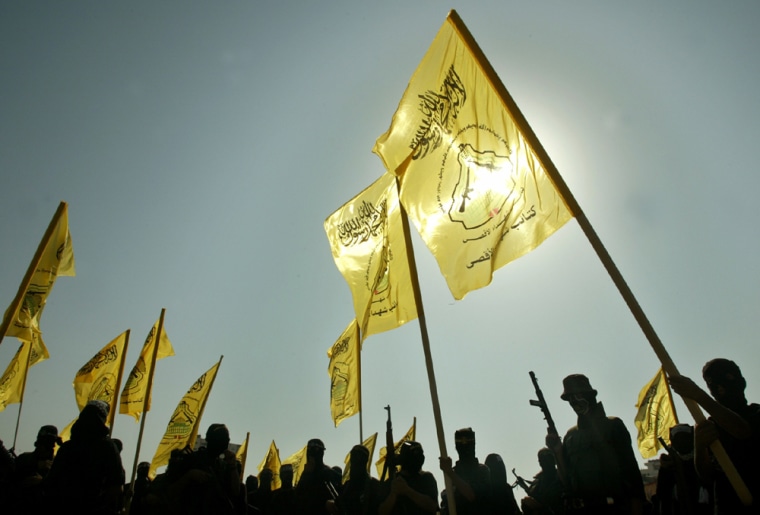Palestinian officials scheduled presidential elections for Jan. 9, pushing forward Sunday with steps to a secure a new leader after the death of Yasser Arafat.
The vote is a key test for the Palestinians, who want a smooth transition of power and hope for renewed international involvement in Mideast peacemaking. Arafat, who died Thursday, led the Palestinians for four decades and refused to appoint a successor.
By law, elections had to be held by Jan. 9, within 60 days of Arafat’s death. In the meantime, Parliament Speaker Rauhi Fattouh has been sworn in as the caretaker president of the Palestinian Authority, which governs Palestinians in the West Bank and Gaza Strip.
In a continued effort to promote unity, Palestine Liberation Organization chief Mahmoud Abbas traveled to the Gaza Strip on Sunday to greet mourners and meet with rival Palestinian factions, including the militant Hamas and Islamic Jihad groups.
Abbas is widely expected to run in the elections.
Palestinian leaders have called on the international community to pressure Israel to allow the elections to proceed smoothly.
Israel has dozens of checkpoints throughout the West Bank, restricting Palestinian movement. In addition, Israel raided registration stations in disputed east Jerusalem several months ago, preventing most residents from registering to vote.
“It remains to be seen whether Israel is ready to do its part,” said Nasser al-Qidwa, the Palestinian envoy to the United Nations. “Israel must withdraw all its forces from all populated centers in the West Bank and Gaza. ... Without such a thing, elections will not be possible.”
A senior Israeli official, speaking to The Associated Press on condition of anonymity, said Israel would consider Palestinian concerns over the elections, but so far has not received any formal requests.
Voting in East Jerusalem?
One point of dispute emerged immediately: whether Arab residents in East Jerusalem should be able to take part. Some Israelis fear that allowing the city’s 200,000 Arab residents to vote in a such a ballot would strengthen Palestinian claims to the city.
Asked on Israel Radio whether they should be allowed to vote, Israel’s Foreign Minister Silvan Shalom said “I’m not in favor, it could create problems.”
Palestinian Cabinet minister Saeb Erekat responded with outrage to Shalom’s remarks and appealed for international pressure.
“I believe with such statements that Israelis have begun obstructing and putting obstacles in the way of free and fair elections,” Erekat said. “We urge President Bush not to allow the Israelis to obstruct these elections.”
Israeli Prime Minister Ariel Sharon told ministers at Sunday’s weekly Cabinet meeting that he didn’t really agree with Shalom’s position, noting that east Jerusalem Palestinians voted in the 1996 Palestinian elections, government officials said while speaking on condition of anonymity.
Imprisoned Palestinian wants to run
Signaling what could be the start of a spirited campaign, Marwan Barghouti, a leader of the Palestinian uprising who is jailed by Israel, plans to run in upcoming presidential elections, a person close to Barghouti said Saturday.
The candidacy of Barghouti, who supports violence but says he wants peace with Israel, could shake up the calcified world of Palestinian politics.
Barghouti is perhaps the strongest candidate to oust Arafat’s old guard of supporters, and many believe him to be the only leader capable of unifying squabbling Palestinian factions.
Israel is determined not to release Barghouti, who is serving multiple life terms for his role in the killings of four Israelis and a Greek monk. But his prominence could put pressure on Israel to free him.
Barghouti also could represent the best hope for Arafat’s Fatah movement to beat down a challenge by the increasingly popular hardline Islamic militant group Hamas, which is considering running a candidate.
Hopes raised again
In the aftermath of Arafat’s death, Palestinian officials have expressed hope for new peace movements in the region. Hours after Arafat’s burial Friday, Bush and British Prime Minister Tony Blair pledged their support for new peace talks.
Israel has said it wants the new Palestinian leadership to prove itself before peace talks resume.
In a move aimed at building goodwill, Israeli officials have decided to allow Palestinian security forces to continue carrying guns in public, military sources told The AP Saturday.
Israel barred Palestinian security forces from carrying guns in early 2002 after a large Israeli offensive into the West Bank, launched in response to a suicide bombing. Israel lifted the ban ahead of Arafat’s burial.
